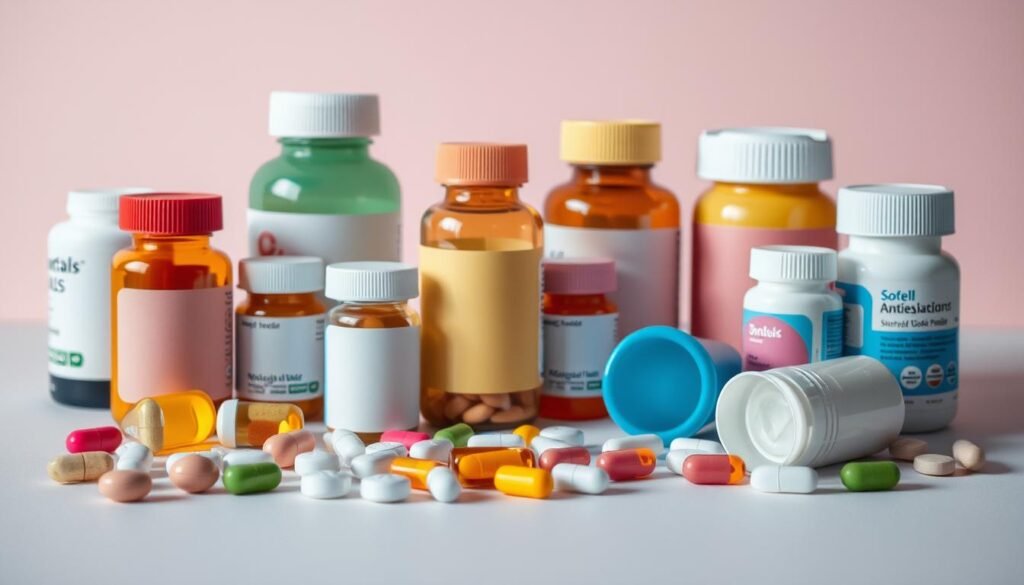Did you know that about 5% to 10% of people worldwide suffer from social anxiety disorder (SAD)? This condition leads to a deep fear of being in social settings. It can stop someone from enjoying daily life. As a result, finding effective treatments is vital to help overcome these fears.
Social anxiety disorder medication is key in treating this issue. Medicines like paroxetine (Paxil) and sertraline (Zoloft) are often used. It’s important to remember that these treatments take time to work. It could be weeks or months before you feel better.
This article looks at medications for social anxiety disorder. It talks about how well they work, what they’re for, and their side effects. All the information is based on the latest research. With the right information, people can choose the best treatment for them. This can lead to improved social interactions.
Key Takeaways
- Approximately 5% to 10% of people globally suffer from social anxiety disorder.
- SSRIs like Paxil and Zoloft are often first-line treatments.
- Symptom improvement from medications can take several weeks to months.
- Choosing the right anxiety medication for social phobia is crucial for effective healing.
- Many may require multiple attempts to find the best medication for their needs.
- Psychotherapy, specifically Cognitive Behavioral Therapy, is often combined with medication for enhanced results.
Understanding Social Anxiety Disorder
Social Anxiety Disorder (SAD), also known as social phobia, involves a deep fear of being judged in social situations. People with SAD feel nervous almost all the time in everyday social interactions. It’s key to understand what is social anxiety disorder to see how it affects lives. Symptoms often start in the teen years. And about 5-10% of people worldwide have it, making it a common anxiety disorder.
This condition is more than just shyness. It can mess up personal relationships, school, and work. More women than men tend to have it. Those with SAD usually try to avoid places where they feel anxious. They fear being watched closely by others, which can cause a lot of stress.
Besides knowing how tough this disorder can be, it’s good to learn about treatment options. Treatments usually involve therapy and sometimes medicine. With the right help, many people can handle their social phobia better.
| Aspect | Details |
|---|---|
| Definition | Social anxiety disorder, also known as social phobia, is characterized by intense fear in social interactions. |
| Prevalence | Affects about 5-10% of the global population. |
| Age of Onset | Typically begins around 13 years of age. |
| Gender Distribution | More prevalent in individuals assigned female at birth. |
| Common Symptoms | Extreme avoidance of social gatherings and overwhelming fear of judgment. |
Symptoms of Social Anxiety Disorder
Social anxiety disorder, also known as social phobia, impacts people deeply. It makes folks dread judgment in social cases. This fear often stops them from joining social activities.
Signs of this disorder appear both physically and emotionally. It turns simple tasks like eating with others, speaking openly, or making phone calls into big challenges.
The psychological symptoms often include:
- Intense fear of being embarrassed or humiliated
- Preoccupation with perceived flaws or negative judgments from others
- Significant avoidance of social events and gatherings
- Feelings of inadequacy or low self-esteem
Physical symptoms are common too. They show up as:
- Rapid heartbeat or palpitations
- Sweating and trembling
- Dizziness or lightheadedness
- Nausea or gastrointestinal discomfort
- Blushing or stammering in conversation
Without treatment, social anxiety disorder can cause isolation, struggle in school, and workplace issues. People may turn to alcohol in social settings or use things like headphones to feel safer in public.
It’s vital to address symptoms early. When noticed in childhood, they can grow into tougher challenges. Knowing these signs can lead to seeking help, like therapy (CBT) or medication.
| Psychological Symptoms | Physical Symptoms |
|---|---|
| Intense fear of embarrassment | Rapid heartbeat |
| Preoccupation with negative judgment | Sweating and trembling |
| Significant avoidance of social events | Dizziness |
| Feelings of inadequacy | Nausea |
The Role of Medications in Treatment
Medications help people with social anxiety manage their symptoms. Picking the right medication depends on personal symptoms, past treatments, and preferences. While talking therapies are important, the right medication for social anxiety treatment can quickly ease symptoms of anxiety.
Doctors often prescribe SSRIs, like sertraline (Zoloft) and paroxetine (Paxil). These are approved for treating social anxiety. They can control symptoms but might cause side effects such as nausea, sleep issues, and sexual dysfunction.
SNRIs like venlafaxine (Effexor XR) are also used. They can improve mood but may cause dizziness and raise heart rates in some people. Beta-blockers, like propranolol, reduce physical symptoms like sweating and shaking. However, they may not work for every type of phobia.
Benzodiazepines, including clonazepam, provide quick anxiety relief. But, there’s a risk of dependency. Side effects include drowsiness and addiction risk. Buspirone is a non-addictive option that lowers anxiety without causing sleepiness, but its effectiveness varies.
The National Institute of Mental Health says combining medication with therapy works best. Keeping up with healthcare appointments is crucial. It helps adjust medication and ensure the best results for those with social anxiety disorder.
First-Line Treatments: SSRIs
SSRIs, or Selective Serotonin Reuptake Inhibitors, are top meds for social anxiety. They are often the first choice for treating this condition. By boosting serotonin in the brain, they help control mood and anxiety.
Common SSRIs Prescribed
Many SSRIs are known to be effective against social anxiety. Among the top ones prescribed are:
- Paroxetine (Paxil): Approved for panic disorder, generalized anxiety disorder, and social anxiety disorder.
- Sertraline (Zoloft): Indicated specifically for panic disorder and social anxiety disorder.
- Escitalopram (Lexapro): Primarily indicated for generalized anxiety disorder.
- Fluoxetine (Prozac): Approved for panic disorder.
- Citalopram (Celexa) and Fluvoxamine (Luvox): These SSRIs lack specific FDA indications for social anxiety disorder.
How SSRIs Work
SSRIs increase serotonin action in the brain, which eases mood and anxiety. Most people see benefits within weeks. Side effects can happen but are generally mild, like dizziness or upset stomach.
Serotonin-Norepinephrine Reuptake Inhibitors (SNRIs)
Serotonin-Norepinephrine Reuptake Inhibitors, or SNRIs, are important for treating social anxiety. They’re useful when SSRIs don’t work well. These meds increase serotonin and norepinephrine in the brain. This helps reduce anxiety symptoms. Examples include Venlafaxine (Effexor XR) and Duloxetine (Cymbalta).
Popular SNRIs for Social Anxiety
Venlafaxine and Duloxetine are top choices for battling social anxiety disorder. They’re approved by the FDA to treat anxiety issues. This makes them solid options for those looking to ease social anxiety feelings. Yet, be mindful of side effects like nausea, dizziness, and raised blood pressure. It’s especially important for under 25s. They have a higher risk of having suicidal thoughts or behaviors when on SNRIs.
If you abruptly stop taking SNRIs, you might face withdrawal symptoms. That’s why tapering off properly matters. It helps make quitting these meds smoother. Healthcare providers should watch over patients. They need to lower risks like serotonin syndrome, even though it’s rare. SNRIs open up another path for those who don’t get enough help from SSRIs.
Other Antidepressants
Social anxiety disorder (SAD) is tough to treat. SSRIs and SNRIs are often used, but there are other choices. Monoamine Oxidase Inhibitors (MAOIs) are an option for those who don’t get better with first-line treatments. Yet, MAOIs need careful diet monitoring because of food and drug reactions.
Finding the Right Antidepressant
Finding the right antidepressant is a personal journey. It depends on your genes, history, and the symptoms you have. Often, trying different medications is necessary to find the right one. Talking with healthcare experts is critical as they guide you through the options for treating social anxiety.

Benzodiazepines: Short-Term Solutions
Benzodiazepines like alprazolam (Xanax) and clonazepam (Klonopin) offer short-term anxiety medication. They help those with social anxiety. These meds provide quick relief for acute anxiety situations. They boost neurotransmitters in the brain, creating a calm feeling. This is vital during stress, like speaking in public or attending social events.
While helpful, benzodiazepines should be used for a short time to avoid dependency. Using them regularly can lead to addiction risk, especially for those with substance abuse history. Doctors suggest using them only when needed. They often recommend taking them for just a few weeks. This helps lower the risks of long-term usage.
The relief from benzodiazepines is brief, lasting only a few hours. After this initial phase, switching to SSRIs for a long-term solution is usual. But, it’s crucial to talk with healthcare providers about how to slowly stop taking them. Slowly reducing benzodiazepines usually takes 2-4 weeks after starting SSRIs. This helps prevent withdrawal symptoms, which can start days after stopping.
Be cautious with benzodiazepines and always follow medical advice. Combining these meds with alcohol is extremely risky. With careful use, benzodiazepines can be an effective part of treating social anxiety. They should be a part of a bigger treatment plan.
Beta-Blockers: Managing Performance Anxiety
Beta-blockers like propranolol and atenolol have two main uses. They help with heart issues and managing performance anxiety. They stop signs like fast heartbeats and shaky hands. This is great for those feeling anxious in situations like public speaking or performances. Remember, beta-blockers aren’t for daily social anxiety treatment.
Usage Scenarios for Beta-Blockers
Beta-blockers help in different cases, mainly for short-term anxiety relief. Here are usual cases where they might be used:
- Public speaking engagements
- Musical performances
- Job interviews
- Social gatherings where public interaction may provoke anxiety
They start working in one to two hours after taking them. This makes them good for quick anxiety relief. But, they don’t work well for all social fears.

| Medication | Common Usage | Effects | Side Effects |
|---|---|---|---|
| Propranolol | Performance anxiety, stage fright | Reduces heart rate, tremors | Fatigue, dizziness, cold extremities |
| Atenolol | Specific performance scenarios | Alleviates physical anxiety symptoms | Headaches, gastrointestinal issues |
The side effects can be mild like tiredness or stomach issues. Yet, those with asthma or heart problems need doctor advice first. When used right, beta-blockers greatly help with performance anxiety. They make tough situations easier to handle.
Social Anxiety Disorder Medication: Alternatives and Considerations
People with social anxiety disorder often seek different options aside from standard drugs. These alternatives to medications may include herbal remedies and dietary supplements. Some people think these can help manage symptoms. Research on their effectiveness varies, but exploring them along with traditional methods is valuable for many.
Herbal Remedies and Supplement Safety
Valerian root and kava are popular herbal remedies for anxiety. Valerian root is known for its calming effects. Kava is believed to help with anxiety and relaxation. However, users should be cautious. Both remedies can have side effects and might affect other medications.
Before trying new treatments, talking to a healthcare provider is key. They can offer advice suited to your health needs. This can also help avoid any bad reactions with other treatments you’re on.
| Herbal Remedy | Potential Benefits | Safety Considerations |
|---|---|---|
| Valerian Root | May improve sleep and reduce anxiety | Possible side effects include dizziness and drowsiness |
| Kava | May promote relaxation and anxiety reduction | Linked to liver damage in some cases |
| L-theanine | May help reduce stress-related symptoms | Generally considered safe but effects can vary |
| Omega-3 Fatty Acids | Has shown potential in reducing anxiety symptoms | May interact with certain anticoagulant medications |
Therapies in Conjunction with Medication
Therapies for social anxiety are crucial when paired with medication. Cognitive Behavioral Therapy (CBT) is particularly effective. It helps people challenge and change negative thoughts. They also learn to face what makes them anxious, leading to better coping methods.
Cognitive Behavioral Therapy (CBT) Effectiveness
Many studies support CBT’s effectiveness for treating social anxiety. When combined with medication, the success rate is about 54.2%. CBT alone has a success rate of 51.7%. Compared to fluoxetine, a common medication, which has a 50.8% success rate, combining treatments seems slightly better.
CBT can cut anxiety symptoms by 50-75% for a lot of people. This is a big help over time. It gives patients tools to manage anxiety on their own after stopping medication. About 70% of patients reported less anxiety when using both therapies together. This shows why it’s important to include CBT in treatment plans.

Conclusion
Managing social anxiety involves finding the right balance. This includes medication and therapy options. About 12.1% of U.S. adults face social anxiety at some point. This shows how important it is to find treatments that work for each person.
People with this disorder might avoid group activities or fear public speaking. These situations can make daily life and personal growth hard.
Some medications, like SSRIs, have been effective. Sertraline and venlafaxine are good examples. Yet, caution is key with certain drugs, like benzodiazepines, because they can be addictive.
Working with healthcare professionals is crucial. It helps individuals choose the best treatment and track how well it’s working.
Therapies, like cognitive behavioral therapy (CBT), can make medications even more effective. Knowing all the treatments available can help those affected. They can find the best support and improve their lives.